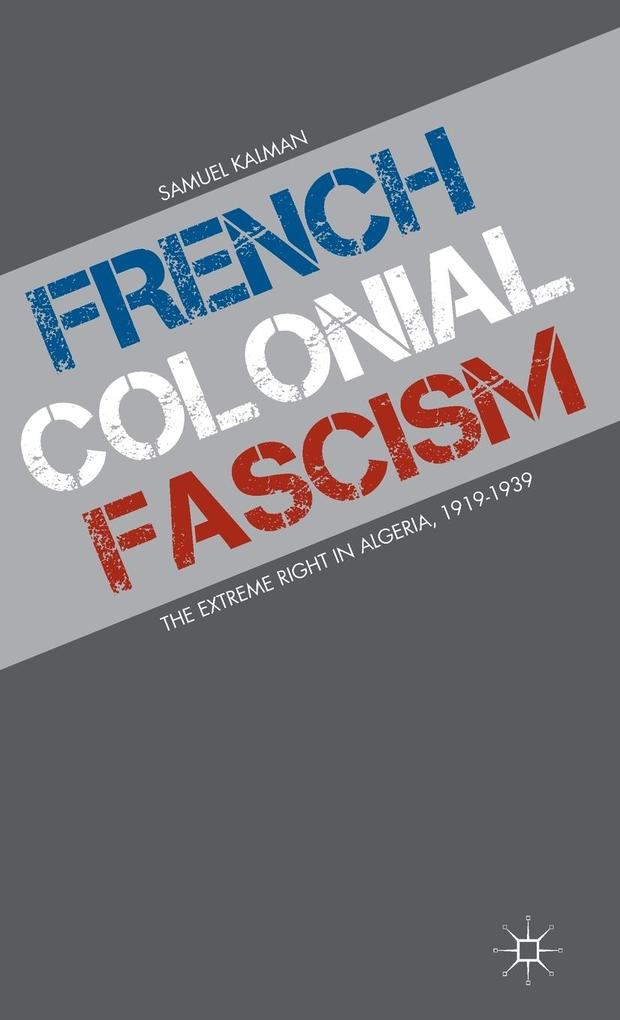
Zustellung: Di, 10.06. - Fr, 13.06.
Versand in 1-2 Wochen
VersandkostenfreiBestellen & in Filiale abholen:
This study investigates the various extreme-rightist leagues in Algeria, with particular attention to certain key themes, among them the rabid xenophobia directed at the Jewish population and local Muslims. It demonstrates that fascism helped to construct a racial hierarchy to preserve European hegemony and a pool of cheap labor.
Inhaltsverzeichnis
1. The Action Française, Jeunesses Patriotes, Unions latines, and the Birth of Latinité (1919-1931) 2. The Algerian Extreme Right, the Great Depression, and the Birth of Muslim Nationalism: The Croix de Feu and the Front Paysan (1928-1935) 3. An Algérianiste Insurrection: The Rassemblement national d'Action sociale and the Amitiés latines (1936-1938) 4. The Transformation of Metropolitan Strategy into Colonial Practice: The Parti populaire français and the Parti social français
Produktdetails
Erscheinungsdatum
07. Oktober 2013
Sprache
englisch
Auflage
2013 edition
Seitenanzahl
286
Autor/Autorin
S. Kalman
Verlag/Hersteller
Produktart
gebunden
Abbildungen
XI, 286 p.
Gewicht
476 g
Größe (L/B/H)
218/140/23 mm
ISBN
9781137307088
Entdecken Sie mehr
Pressestimmen
'Samuel Kalman's French Colonial Fascism is an exceptionally well researched and very judicious account of the extreme Right in inter-war Algeria. It makes an important contribution to the ongoing debate on French fascism in the last two decades of the Third Republic and goes a long way to helping our understanding of the Algerian tragedy in the 1950s.' - William D. Irvine, Professor, Department of History, York University, Canada
'The first in-depth study of ultra-rightist groups in interwar Algeria, French Colonial Fascism is an unsettling but gripping read. Exploring the connections between settlers' attachment to a racialized view of Algerian social relations and the growing appeal of ultra-rightist ideology after World War One, Sam Kalman has produced a work of real originality, the first exploration of the warped moral economies of settler fascism.' - Martin Thomas, Professor of European Imperial History, University of Exeter, UK
'Frontier communities that feel threatened are prone to nationalist and racist extremism. The European settlers in Algeria formed a particularly virulent case. Samuel Kalman's French Colonial Fascism explores compellingly their actions and doctrines between the two world wars as they strove to exclude Jews, to keep Muslims subjugated, and to loosen the control of metropolitan French authorities that seemed to them too soft.' - Robert O. Paxton, Professor of History emeritus, Columbia University, USA
'A well-researched, fluidly written, contribution to our understanding of inter-war settler politics in Algeria. This work is essential reading for anyone interested in the development of different forms of fascism and in French inter-war colonialism.' - Patricia M. E. Lorcin, Professor of History, University of Minnesota, USA, and author of Historicizing Colonial Nostalgia
'Written beautifully and meticulously studied, Samuel Kalman's book exposes the specific fascist ideology of European settlers in Algeria. Anyone who is interested in the history of the French settlers in Algeria specifically and colonial relations in general will find this book fascinating and deeply enriching.' - Ruth Ginio, Department of History, Ben Gurion University of the Negev, Israel
'The first in-depth study of ultra-rightist groups in interwar Algeria, French Colonial Fascism is an unsettling but gripping read. Exploring the connections between settlers' attachment to a racialized view of Algerian social relations and the growing appeal of ultra-rightist ideology after World War One, Sam Kalman has produced a work of real originality, the first exploration of the warped moral economies of settler fascism.' - Martin Thomas, Professor of European Imperial History, University of Exeter, UK
'Frontier communities that feel threatened are prone to nationalist and racist extremism. The European settlers in Algeria formed a particularly virulent case. Samuel Kalman's French Colonial Fascism explores compellingly their actions and doctrines between the two world wars as they strove to exclude Jews, to keep Muslims subjugated, and to loosen the control of metropolitan French authorities that seemed to them too soft.' - Robert O. Paxton, Professor of History emeritus, Columbia University, USA
'A well-researched, fluidly written, contribution to our understanding of inter-war settler politics in Algeria. This work is essential reading for anyone interested in the development of different forms of fascism and in French inter-war colonialism.' - Patricia M. E. Lorcin, Professor of History, University of Minnesota, USA, and author of Historicizing Colonial Nostalgia
'Written beautifully and meticulously studied, Samuel Kalman's book exposes the specific fascist ideology of European settlers in Algeria. Anyone who is interested in the history of the French settlers in Algeria specifically and colonial relations in general will find this book fascinating and deeply enriching.' - Ruth Ginio, Department of History, Ben Gurion University of the Negev, Israel
Bewertungen
0 Bewertungen
Es wurden noch keine Bewertungen abgegeben. Schreiben Sie die erste Bewertung zu "French Colonial Fascism" und helfen Sie damit anderen bei der Kaufentscheidung.










